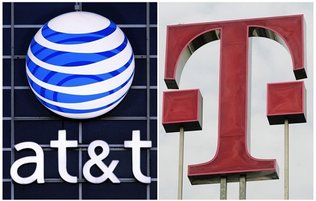
Over at PC Mag, some big questions that have been on everyone’s mind since AT&T announced last Sunday that they were buying T-Mobile from Deutsche Telekom for something on the order of $39 billion get answered by the one and only Lance Ulanoff. Among them, topics like whether or not your T-Mobile phone will suddenly be an AT&T phone, or whether T-Mobile will survive at all are all on the table.
After all, it’s important to note that the implications for the merger have a little less to do with users (as T-Mobile was the smallest of the big four wireless carriers) as it does with the industry: AT&T doesn’t want T-Mobile’s customers, it really wants T-Mobile’s network. See this question:
3) Why Didn’t AT&T Buy Sprint?
I’d say it’s the network. Sprint is a CDMA carrier, which makes it more like Verizon. AT&T uses the GSM network, the same as T-Mobile. That said, network platforms are changing fast. T-Mobile has its 4G-like HSPA+ and AT&T is working, slowly, on its 4G LTE build-out.
That’s the clincher. AT&T is willing to absorb T-Mobile in order to get its spectrum and its network and infrastructure. Don’t get me wrong, AT&T whines a lot about spectrum but they’re not hurting as much as they allow themselves to hurt by not beefing up their own infrastructure with decent investment in it, but this is one way for them to get a little more saturation.
Which raises this question:
5) Why didn’t AT&T Use that $39 Billion to Build Out its 3G Network?
I saw this question on Twitter and had to laugh. AT&T was, prior to Verizon LTE, the fastest mobile network around, but it was also the most inconsistent. I carry a BlackBerry Torch 9800 and the Swiss cheese 3G coverage drives me to distraction. AT&T has pretty much acknowledged the issues with its 3G network, but has also touted all the work it’s done in the last two years (like using more spectrum) to build up its 3G coverage. None of it seems to have helped much, though. Obviously, it takes time, effort, and money to build out a better network. I bet that even a portion of that $39 billion could have made a huge difference in AT&T’s 3G coverage.
You know, I thought this too as soon as I saw the news, and while Lance takes a more measured approach to answering it, I’m a little more livid at the notion that AT&T managed to get $39 billion – mostly in cash – to close the deal for T-Mobile, but could have wiped them off the map with market forces if they were willing to invest in their future and in their network.
Instead, they’re taking a more tactical, market driven approach that makes their balance sheets look better in the short-to-mid term by adding more assets, adding more revenue, and shrinking both companies to try to do more with less (in the name of streamlining due to the merger, of course) as opposed to actually improving their service offerings. Still, that’s been the AT&T way, ever since it bought Cingular: buy the good things and then drag them down with you.
Still, some people are optimistic that the FCC will block the move, or at least create enough friction that the deal falls through. I’m with Lance here: I think the deal is inevitable, partially because the US Government does not and never has understood the complexities of technology enough to know that this is probably a bad idea for customers.
It’s not just wireless phones that this applies to: the FCC allowing Comcast to buy NBC Universal is another example, and the FCC allowing XM and Sirius to merge is another example of how easily officials can be fooled by lobbyists who can smooth over the anticompetitive mergers by pointing out competition in radically different markets (for XM/Sirius, they said “but there’s still traditional terrestrial radio to compete with us,” conveniently avoiding the fact that if you wanted satellite radio or had no terrestrial radio in your area, there would be no other option than their newly formed company.)
So to that end, we’re looking at a wireless marketplace that will eventually be two major carriers and a few bit players: Verizon and AT&T far and away the major competitors, and then a smaller batch of companies in the way of Sprint, MetroPCS, Cricket, and other startups that essentially leverage spectrum and infrastructure already used and partially owned by the big two. Who wins here? Shareholders of the big players, that’s for sure, but the consumer? Likely not.
